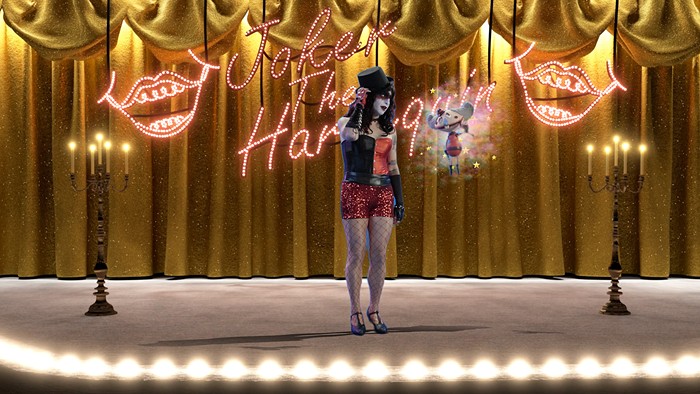When the COVID-19 pandemic first shut down Oregon back in March of last year, Lani Jo Leigh, the longtime owner of the Clinton Street Theater in Southeast Portland, had no idea if her theater would survive.
“I’m 67,” Leigh said. “We were having to throw our own retirement savings at keeping the theater alive, and at some point, as reasonable people, knowing that I’ve still got years ahead of me, I just kept thinking, do we cut our losses and just walk away?”
The theater couldn’t show movies or host live productions. But she wasn’t ready to give up the theater, which she thinks of almost as another person.
“We still felt like we needed to be in touch with our community: We’re still here and we’re still trying to make a go of it,” she said. “So we changed the marquee.”
As months progressed, the ever-changing marquee became frequent social media fodder, taking aim at Donald Trump, local political leaders, uplifting the Black Lives Matter movement, and serving as a national, and sometimes global representation of Portland’s response to protests inspired by the murder of George Floyd and the federal occupation that followed.
The Clinton, which Leigh has owned since 2012, is not new to activism. The Burgerville Workers Union held its first meeting at the theater in 2016, after which it marched to the Burgerville located on Powell Boulevard.
In the past, the theater has played host to the Democratic Socialists of America, the Service Employees International Union (SEIU), and other progressive organizations. But after direct community support and donations helped the theater survive the pandemic, Leigh feels the need to reinvest in the city.
“Now that we’re showing movies again, we feel like we have to put up what we’re playing,” Leigh said.
That means screening a movie each Monday night as part of a “Resistance Series” to raise money for a local organization like the community radio station KBOO or the recovery support-focused Alano Club of Portland. For Leigh and programmer Aaron Colter, it also means urging you to sign the petition to kick the mayor out of office.
In August, the theater screened Total Recall—a 1990 Paul Verhoeven movie starring Arnold Schwarzenegger as a bored construction worker who dreams of a trip to Mars—to raise money for the campaign that aims to recall Portland mayor Ted Wheeler.
“Theaters aren’t just a place for popcorn and movies, they inform culture and bring together neighborhoods,” Colter wrote in an email to the Mercury. “It’s important that film, like all art, pushes society forward in some way.”
The theater’s brass, it can safely be said, has no great love for the embattled mayor.
“I think Ted Wheeler is doing a really cuss-word job,” Leigh said. “And I think it’s important that when our elected officials are doing cuss-word jobs that they need to be held to account and told that there is a good portion of their population that is upset.”
Leigh cites Wheeler’s record as police commissioner as the major reason why she supports recalling him.
“The [police] are all over the Black Lives Matter protesters… and standing way back when the right wing protesters are out there,” she said.
The Clinton wasn’t not alone in utilizing its marquee as a creative space with which to speak out last year, and it’s similarly not alone in its direct support for progressive causes in Portland.
Though the recall campaign got off to a slow start in collecting the signatures it needs to force a vote on Wheeler’s future, it has been notable for the amount of cooperation it’s received from performance and artistic spaces, along with restaurants and other shops across the city.
Eric Isaacson, owner of Mississippi Records in North Portland, said that while he feels that political engagement should not be expected of every business, shops “do have a responsibility to be in touch with people in your neighborhood’s needs.”
Isaacson does not see Wheeler, a mayor who he accuses of buying his narrow re-election victory last year, as living up to that standard.
“I worked [in] social services for years and still have lots of contact with that world,” Isaacson wrote in an email to the Mercury. “When a millionaire starts making life hell for houseless people, we should all be pissed. Everyone on street-level knows Ted is an enemy to the poor in this town.”
Mississippi Records is one of a number of local businesses serving as a site at which voters can sign the recall petition, drop off sheets filled with signatures, or both.
Another is Oregon Public House, a public benefit corporation that donates its proceeds to non-profit partner organizations. The pub hosted a stop on a Pedalpalooza bike ride, led by the Recall Wheeler campaign, where it sold discounted beers to participants.
People asked how they could donate to the recall effort, which gave the pub an idea: It’s now set to host weekly fundraisers for the campaign and, in the words of bartender and community liaison Tristan Isaac, “throw down hard for the recall.”
“There is already considerable business interest in Portland politics, which comes from the Portland Business Alliance,” Isaac said. “So it’s not unprecedented that businesses are involved in politics, they’re just usually involved on the side of people like Ted Wheeler.”
That divide has been exacerbated by a Wheeler administration that Isaac sees as catering more to wealthier, downtown-concentrated business interests as the pressure on restaurants, artists, and performance spaces—along with regular Portlanders—has only slightly lessened since the beginning of the pandemic.
“We’re still struggling,” Leigh, of the Clinton, said. “There’s still a struggle to make things right, and we have to understand all that’s wrong and ways that we can make it better. So my resolve is stronger.”




















